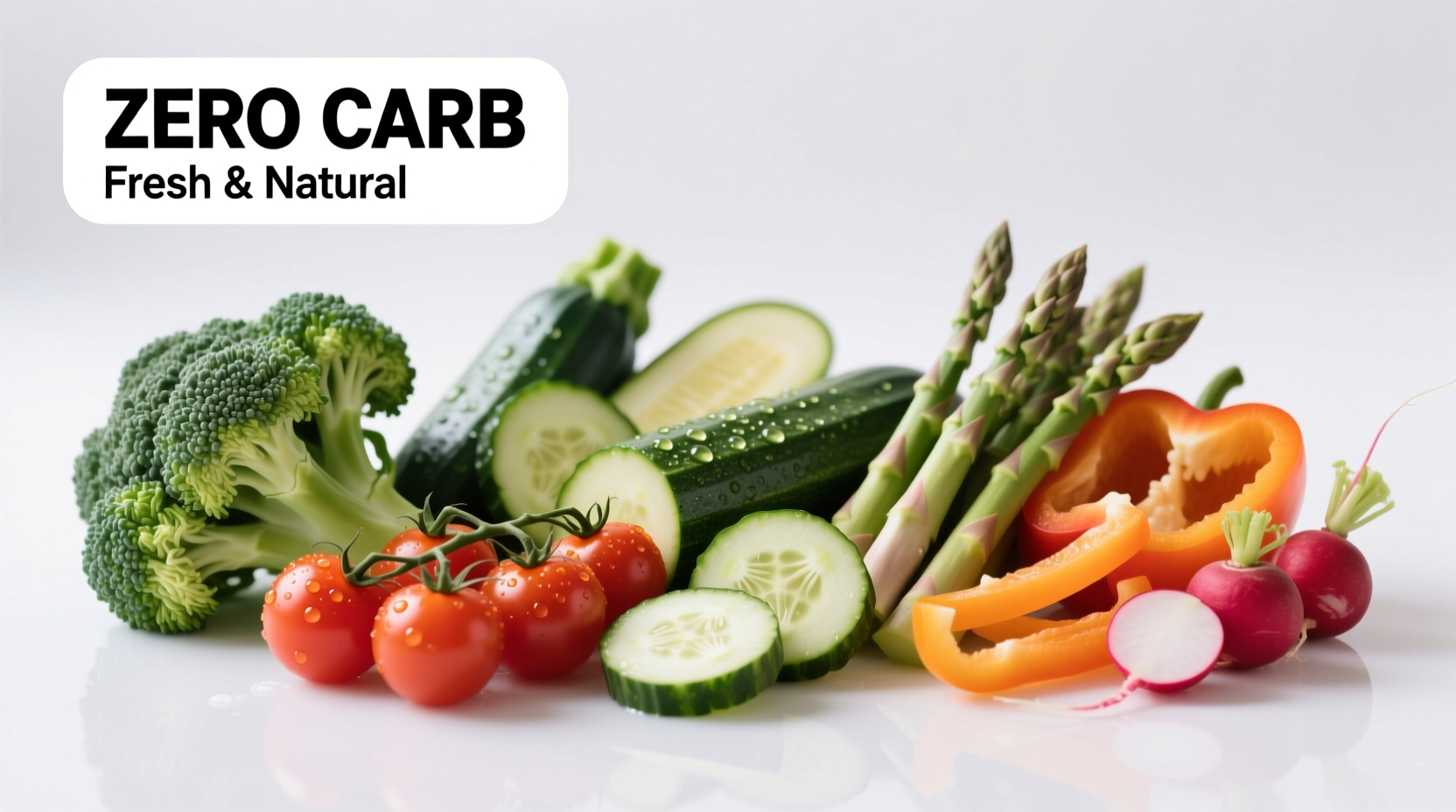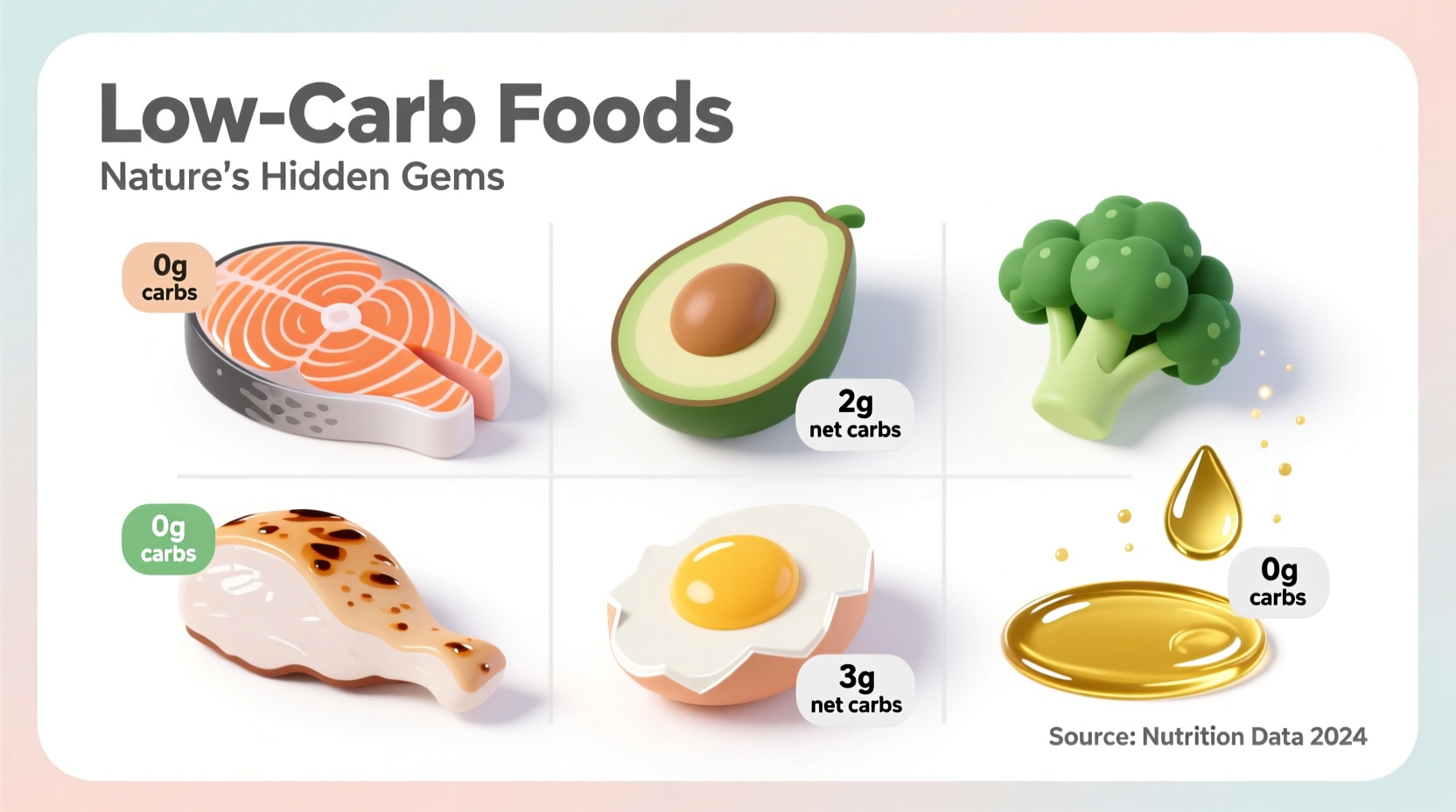Searching for what foods don't have carbs typically means you're following a strict low-carb or ketogenic diet, managing diabetes, or exploring metabolic health approaches. While many foods claim to be 'low-carb,' very few contain absolutely zero carbohydrates. Understanding which foods genuinely contain no carbs is crucial for maintaining ketosis or managing blood sugar levels effectively. This guide provides scientifically accurate information about truly carb-free foods, backed by nutritional science and dietary research.
Understanding Zero-Carb Foods: The Scientific Reality
Carbohydrates are primarily found in plant-based foods and dairy products. Animal tissues don't store carbohydrates in the same way plants do—they store energy as fat and protein instead. This biological difference explains why pure animal products contain zero carbs. According to USDA FoodData Central, unprocessed meats, poultry, and seafood contain no measurable carbohydrates when analyzed in laboratory conditions.
True Zero-Carb Food Categories
Unprocessed Animal Proteins
These foods contain absolutely no carbohydrates when in their natural, unprocessed state:
- Beef, pork, lamb, and other red meats (steaks, roasts, ground varieties)
- Poultry (chicken, turkey, duck)
- Seafood (salmon, tuna, shrimp, cod)
- Organ meats (liver, kidney, heart)
Important note: Processing methods can introduce carbs. Breaded, marinated, or pre-seasoned meats often contain hidden carbohydrates from sauces, coatings, or additives. Always check labels on processed meat products.
Pure Fats and Oils
These cooking fats contain zero carbohydrates:
- Olive oil
- Coconut oil
- Avocado oil
- Butter and ghee
- Lard and tallow
- MCT oil
These pure fats are essential for adding calories and flavor to zero-carb diets. The American Heart Association confirms that pure fats contain no carbohydrates, though they should be consumed as part of a balanced approach to dietary fats.
| Food Category | True Zero-Carb? | Common Carb Contaminants | Safe Preparation Tips |
|---|---|---|---|
| Unprocessed Meats | Yes | Breading, marinades, sauces | Buy plain cuts, season yourself |
| Eggs | Yes | Added fillers in liquid egg products | Use whole eggs in shell |
| Cheese | No (trace carbs) | Naturally occurring lactose | Hard cheeses have fewer carbs |
| Vegetables | No | Natural plant carbohydrates | None are truly zero-carb |
Eggs: The Perfect Zero-Carb Protein
Whole eggs contain zero carbohydrates. Each large egg provides about 6 grams of high-quality protein and essential fats. The National Institutes of Health confirms eggs are one of the most nutrient-dense zero-carb foods available, containing vitamins A, D, E, and B12 along with choline and selenium.

Zero-Carb Beverages
These beverages contain no carbohydrates:
- Pure water
- Black coffee (without additives)
- Plain tea (without additives)
- Electrolyte drops in water (sugar-free)
Be cautious with flavored waters, diet drinks, and 'zero-sugar' beverages, as some contain artificial sweeteners that may affect insulin response in sensitive individuals, despite having zero measurable carbs.
Common Misconceptions About Zero-Carb Foods
Many foods are mistakenly believed to be carb-free. Understanding these distinctions is critical for strict low-carb diets:
Dairy Products: Not Truly Zero-Carb
While often low-carb, dairy products contain lactose (milk sugar). Even hard cheeses contain trace carbohydrates. According to USDA data, cheddar cheese contains about 0.4g carbs per ounce—technically not zero, though negligible for most low-carb diets.
Vegetables: None Are Truly Zero-Carb
Many websites claim certain vegetables like spinach or celery are 'zero-carb,' but this isn't scientifically accurate. All plants contain some carbohydrates. For example, 100g of spinach contains approximately 1.4g net carbs. While extremely low, this doesn't qualify as zero-carb.
Practical Zero-Carb Meal Planning
Building meals around truly zero-carb foods requires careful planning:
Shopping Guidelines
- Choose unprocessed meats from the butcher counter
- Read all ingredient labels carefully
- Avoid 'flavored' or 'marinated' products
- Stick to whole, single-ingredient foods
Meal Structure Example
A simple zero-carb meal might include:
- 8 oz grilled steak (zero carbs)
- 1 tbsp butter (zero carbs)
- Black coffee (zero carbs)
This meal provides complete protein, essential fats, and zero carbohydrates—ideal for maintaining ketosis or strict carbohydrate restriction.
Important Considerations for Zero-Carb Diets
While zero-carb eating can be effective for certain health goals, consider these factors:
- Nutritional completeness: Zero-carb diets lack certain vitamins and fiber found in plants
- Long-term sustainability: Most nutritionists recommend including some low-carb vegetables
- Individual variation: Some people thrive on zero-carb while others need minimal plant foods
- Medical supervision: Consult a healthcare provider before starting any restrictive diet
The Academy of Nutrition and Dietetics emphasizes that while zero-carb approaches can be useful short-term for specific medical conditions, most people benefit from including some plant foods for complete nutrition.
Frequently Asked Questions
Do eggs contain any carbohydrates?
No, whole eggs in their natural state contain zero carbohydrates. Each large egg provides about 6 grams of protein and essential fats without any carbs. This makes eggs an excellent choice for strict low-carb and ketogenic diets.
Is butter really carb-free?
Yes, pure butter contains zero carbohydrates. According to USDA FoodData Central, one tablespoon of butter has 100% fat content with no measurable carbs. However, some butter substitutes or flavored butters may contain added ingredients with carbohydrates.
Can I eat cheese on a zero-carb diet?
Most cheeses contain trace carbohydrates from lactose. While hard cheeses like cheddar have very low carb content (about 0.4g per ounce), they aren't technically zero-carb. For strict zero-carb diets, it's best to focus on pure animal fats like butter or ghee instead of cheese.
Do all meats contain zero carbs?
Unprocessed meats contain zero carbohydrates. However, processed meats like bacon, deli meats, and sausages often contain added sugars, fillers, or preservatives that introduce carbs. Always check labels on processed meat products, as even small amounts of added sugars can affect strict low-carb diets.











 浙公网安备
33010002000092号
浙公网安备
33010002000092号 浙B2-20120091-4
浙B2-20120091-4